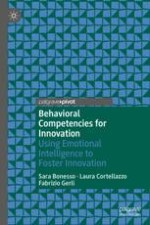2020 | OriginalPaper | Buchkapitel
5. Managing Innovation Through a Competency-Based Approach
verfasst von : Sara Bonesso, Laura Cortellazzo, Fabrizio Gerli
Erschienen in: Behavioral Competencies for Innovation
Aktivieren Sie unsere intelligente Suche, um passende Fachinhalte oder Patente zu finden.
Wählen Sie Textabschnitte aus um mit Künstlicher Intelligenz passenden Patente zu finden. powered by
Markieren Sie Textabschnitte, um KI-gestützt weitere passende Inhalte zu finden. powered by
